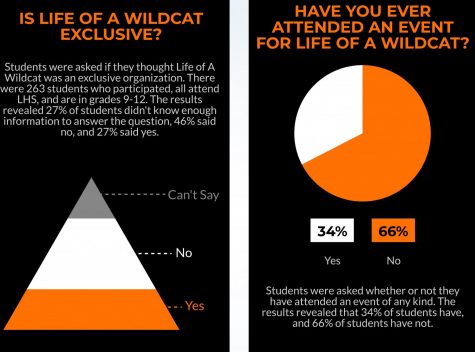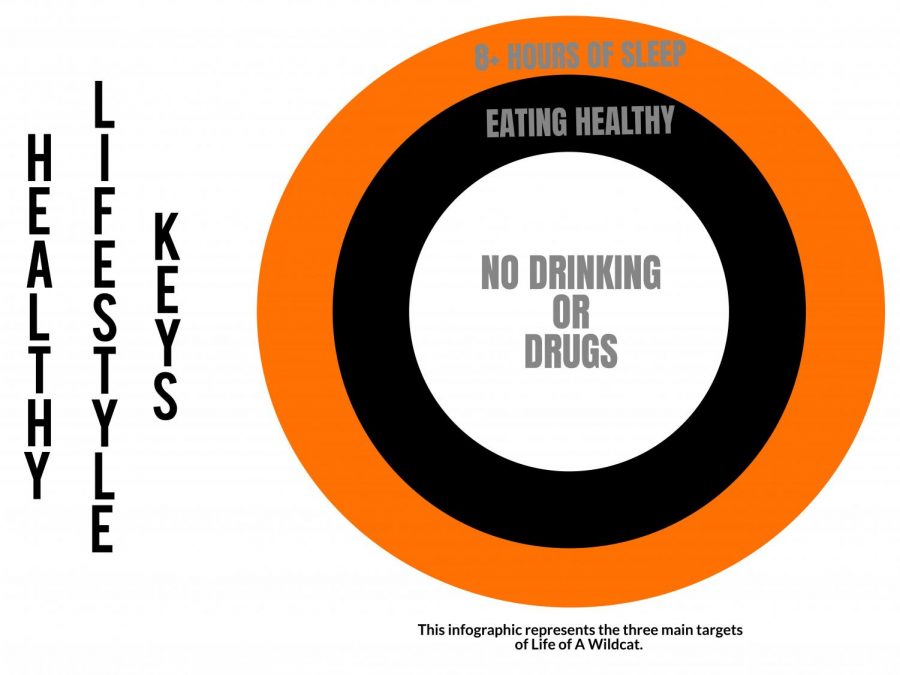The Lowdown on LoW
Life of a Wildcat, or LoW, is an organization that focuses on inspiring students to live a healthy lifestyle at Libertyville High School. The lifestyle is centered around supporting healthy eating, exercise, sleep, a drug- and alcohol-free lifestyle and reducing stress. The group is not considered a club, but instead, a lifestyle.
“By being a lifestyle, we aim to impact all clubs and all sports and just be interconnected with everything at school. It’s all about having conversations about how to promote a healthy lifestyle,” said Dr. Brenda Nelson, the prevention and wellness coordinator at school who introduced the lifestyle to Libertyville last year.
The Organization’s Focus
Dr. Nelson is passionate about students being as healthy as possible and believes an important aspect of that is avoiding drugs and alcohol, which is why she thinks it’s important that the followers of the lifestyle remain faithful to this part of Life of a Wildcat’s code: “If a student [wants] to ‘start developing their drinking muscles before college,’ which I don’t agree with, then go be free. But don’t try to do [that and be a part of LoW].”
A female senior leader who requested to remain anonymous because she remains in the organization despite her criticisms of Life of a Wildcat feels that what Dr. Nelson set out to do is positive, but the message got lost along the way.
“[Dr. Nelson’s] goal is to spread this positive message about living healthy lifestyles, but because it was so centered on alcohol and drugs, it drove a lot of people away,” she said.
This year, some students, mainly seniors, have questioned some of the lifestyle’s practices while others fully support them. The main divide about the group’s reputation comes from the alcohol- and drug-free aspects of the lifestyle, as well as the group’s perceived exclusivity.
However, one of the senior leaders of Life of a Wildcat, Madison Kerber, agrees with Dr. Nelson’s point of view, stating that, “[LoW’s] not just about drugs and alcohol. We’re trying to focus on all parts of your health. Everyone’s invited to this, but you need to make a choice if you want to drink or not. If you are [drinking or doing drugs], then you’re making a choice to not actively improve that part of your lifestyle. I think we are trying to be inclusive to all that want to come.”
To some, such as senior Trevor Evans, who is not affiliated with Life of a Wildcat because he was not invited to events beyond the last one of his junior year, the organization is seen as hypocritical because “[LoW stresses] their drug- and alcohol-free lifestyle so much that they really forget how originally that was only a part of it, but it also included getting the correct amount of sleep, diet, nutrition, [and regulating] stress and mental health. It was not just about consumption. It’s hypocritical of them to include someone who doesn’t get enough sleep to the club but to exclude people who drink.”
According to Nora Tucker, who, like Kerber, is another senior leader in the group, LoW is “trying to make a group of senior students who buy into all aspects of the LoW lifestyle and a very visible part of that is choosing [not] to drink or take drugs.” The attention given to drinking and doing drugs is intentional, Tucker said, as that makes them more important aspects of the lifestyle.
Senior Max Kratcoski, who, like Evans, is not involved with the organization because he also was not invited beyond the last event, believes that these higher standards should only be applied to the leaders of the lifestyle “because they are heavily involved and want to showcase the club. It’s okay for the leaders [to be held to a higher standard] because [LoW wants] to have leaders who are drug- and alcohol-free. To judge people who want to be in the club, participate in activities, and learn about a drug- and alcohol-free life [isn’t okay].” Kratcoski questioned, “Why can’t everyone learn about that? Why do you have to have specific criteria to learn about that?”
Exclusivity
The recruitment process is another contested aspect of the lifestyle’s reputation. The methods Life of a Wildcat uses to gain more followers of the lifestyle, as well as who is invited to join it, have stirred up debate.
For example, to kick off this school year, LoW held a barbeque for potential senior leaders. It was confirmed by several students in the club that they used a list — created by students earlier in the summer who went through the yearbook to highlight students who don’t participate in the use of drugs or alcohol — as an invitation list for the event. This led some students to feel left out and have an unwelcoming perception of the group. Evans and Kratcoski were two such students. Evans discovered from a friend involved with the organization that the two of them were both “crossed off the list.”
According to Tucker, “The goal of the event was not really accomplished; it was a more negative environment because so many people felt excluded and I think it put the people who were invited in an uncomfortable place because they had friends who weren’t invited. It just didn’t give the group or the lifestyle the connotation that it wanted to start the school year.”
Since this incident, the group has been trying to spread their message in a more inclusive way. This has included an email Dr. Nelson sent to all seniors that explained the goals of the organization and sought to set guidelines about the expectations of the lifestyle.
Kratcoski felt the email wasn’t effective in spreading a message of inclusivity.
“The first half of the email said, ‘We’re open if you want to join events,’ but the second half was like, ‘Oh, if you do choose to participate in activities that involve drugs and alcohol, then this club isn’t for you.’ It just gives you that sense that you’re not welcome there even if you want to try to find a way to get out of an unhealthy situation,” he said.
The Future
Life of a Wildcat has been trying to extend its reach to include all students in order to reach their ultimate goal, which, according to Tucker, is 100 percent student involvement. To Dr. Nelson, total involvement means more than just having students attend events.
“My hope absolutely is [total involvement], but moving forward, I think people will start to understand that it’s not so much about recruitment,” she said. “It’s just about [providing] good information to inform [students] why it’s good to live a healthy lifestyle.”
As Dr. Nelson emphasized, the goal of Life of a Wildcat is to encourage all LHS students to live a healthy lifestyle, whether that means joining the organization or not.
The group has used the Paw Street Journal flyers posted in the bathrooms and other announcements to inform all students about their upcoming events, in particular, the Red Ribbon Week hallway decorating last fall.
Tucker said their outreach worked well and “there were a lot of seniors, juniors, sophomores and freshmen at our Red Ribbon Week event, and not all of the seniors had been at the initial senior barbeque. The whole school had been invited and encouraged to come.”
This was a change, as the organization is almost exclusively senior-based. Some, such as the anonymous senior girl referenced earlier, thinks “that the fact that it is an all-senior club shows that it is such a weak club.”
The outreach that has been done this year, such as with Red Ribbon Week, serviced the organization’s goal toward eventually becoming a school-wide phenomenon, despite the concerns about the organization that have arisen during this school year, disseminated mostly from the senior class. Life of a Wildcat plans on continuing these efforts to expand their audience. Only time will tell if these measures will be able to adjust their reputation among upperclassmen at LHS.







![Senior River Thompson joins the Jazz Ensemble by singing “That Old Black Magic” by Mercer and Arlen Arr. Mark Taylor, along with senior Annie Brody on guitar and junior Thomas Teixeira on bass, earning big applause. “[The concert had] great energy because it's the last [jazz concert] of the year,” Brody said.](https://www.lhsdoi.com/wp-content/uploads/2025/04/Eight-That-Old-Black-Magic-600x400.jpg)
![Mr. Abullh Ali, manager/assistant, helps open Queen Yemeni Coffee in downtown Libertyville at 606 North Milwaukee Ave. With the help of employees such as manager and LHS senior Yousef Taha, they are able to bring the Yemeni and Ethiopian culture to Libertyville by using their Queen spices, cinnamon and cardamom in their drinks such as Adani Chai, which is inspired by Sheda, the Queen of Yemen and Ethiopia. “The history of our coffee [is] a long history and we believe that Yemen and Ethiopia started the coffee and we are bringing something unique to the community,” Mr. Ali said.](https://www.lhsdoi.com/wp-content/uploads/2025/04/Photo-1-600x400.jpg)


